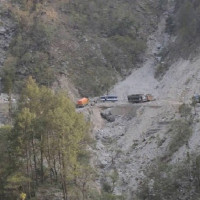- Friday, 4 July 2025
End Fertiliser Crisis
While regarded as an agrarian country, Nepal’s agricultural production is limited owing to traditional and subsistence-based practices. The country has been ineffective in diversifying, commercialising and modernising a sector that is a source of livelihood for 62 per cent of the population. Inadequate access to agricultural inputs like chemical fertilisers also remains a consistent problem. With the arrival of monsoon, it is a critical time for paddy farming in the country. Currently, Nepal’s irrigation facilities are available to only 44 per cent of the total arable land. Hence, monsoon is essential for farmers to plant crops. But at present, even with favourable weather, a lack of chemical fertilisers is hampering farmers.
There have always been issues with the timely procurement, stock maintenance and distribution of fertilisers in Nepal. According to the Ministry of Agriculture and Livestock Development, Salt Trading Corporation Limited and the Agriculture Inputs Company Limited have 11,583 tonnes and 49,000 tonnes of chemical fertilisers, respectively. The government states that this amount is adequate for the farmers. But the real picture is different. But, it is reported that one farmer household has only been able to access 8-10 kilograms of fertilisers. This is forcing them to depend upon middlemen, who are notorious for selling substandard fertilisers for a higher price.
Nepal’s struggle with fertilisers has once again highlighted the need for the immediate establishment of chemical fertiliser plants in the country. Domestic production is imperative to ensure their adequate and regular supply. Even though discussions have continued over the years, the government has not been able to devise a concrete plan for the same. If not the domestic plant, the country has the option to ensure a smooth and sustainable supply of chemical fertilisers. The ministry has allocated about Rs. 28.8 billion for the import of chemical fertilisers for the upcoming fiscal year. It plans to import 300,000 metric tonnes of the agricultural input.
But, fertilisers in the international market are very expensive, and we do not have enough financial resources to procure them. In such a situation, Nepal also has the option to use organic fertilisers generated from biodegradable waste. This can not only help meet farmers’ needs but also support the country’s solid waste management efforts. Recently, it was reported that a granulated organic fertiliser plant was established in western Nepal with the ability to generate 200 tonnes of fertiliser daily. Such an initiative points to the need for mechanising agriculture to reduce production costs and prevent fertiliser shortages.
In Nepal, with each passing year, the contribution of the agriculture sector to the country’s Gross Domestic Product (GDP) is going down. The availability of chemical fertilisers is closely linked with the state of the country’s crop production, food security and economic growth at large. A lack of fertiliser can discourage farmers and even push them to leave this sector. We do not want this.
Because the majority of the issues evident in agriculture remain under our own control, the government must rectify and tackle them promptly. It is high time the government listened to the plea of the farmers and acted immediately. When there is a strong political will, managing the longstanding fertiliser issue is not a big deal for the government. After all, the nation’s path to enhanced production and productivity can only begin by prioritising such small but imperative steps.















